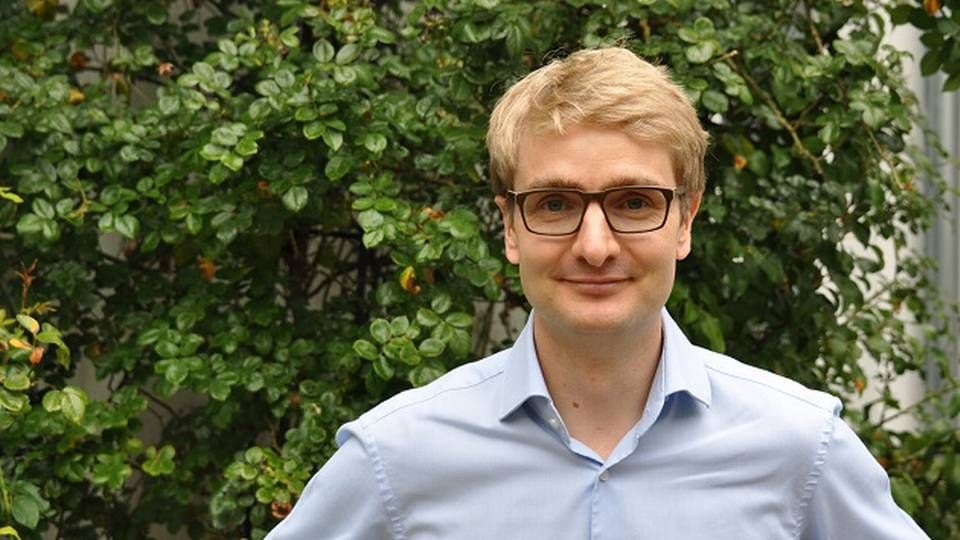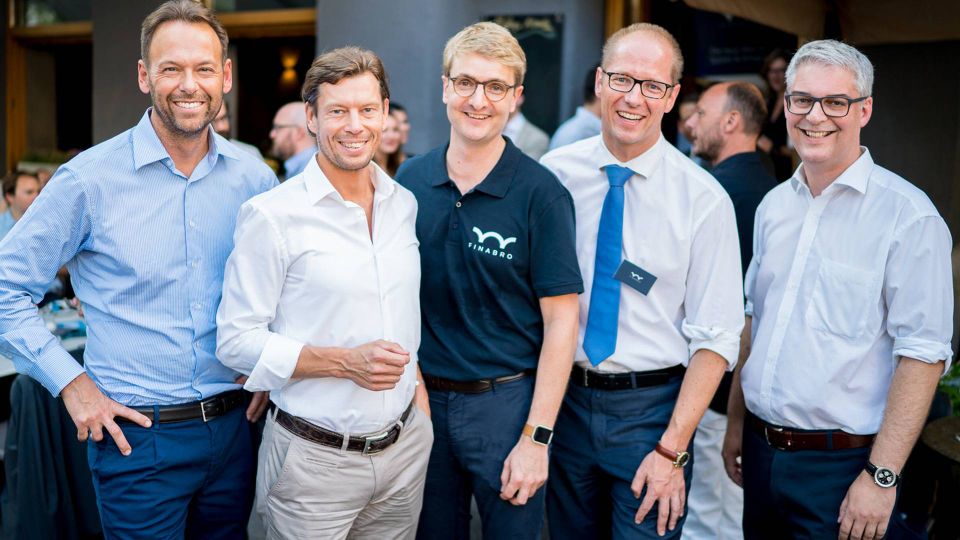Dane aims to solve pension problem in Austria and Germany

Denmark's Søren Obling and his Austrian business partner plan to get Austrians and later on Germans to save for retirement.
They will do this via their joint firm Finabro, which is a mix of private banking for individuals and a pensions-saving project.
With the two national markets having a combined population of 90 million inhabitants, there is huge potential for the new business venture.
"It's a huge market, and that makes it overwhelming, but it also means there is great potential. It's really hard to draft precise estimates of how big our market is, but the market we're targeting is at least more than EUR 10 billion," says Obling.
The idea is so good that insurance company Uniqa has joined the endeavor as a key investor. Uniqa CEO Andreas Brandstetter came to the Finabro launch party, and this triggered heightened media exposure in Austria
"So it's a positive start, but now we need customers in our business. That's a slower process. That's the hard work," says Obling.
Online platform makes capital consulting cheaper
Finabro, created from the Danish words "finans" (finance) and "bro" (bridge), consists of an online platform where consumers can handle their financial activity. One part of Finabro is an investment platform for regular people who cannot afford to take advantage of private banking services at their bank.
"The service you get if you have DKK 5 million or more at Nordea or Danske Bank's private banking is a very complete service where many aspects are touched upon. But it's just too expensive," Obliong says, adding:
"However, if you make this product and make it 100 percent in software, then you don't have any variable costs. So when you've made the software once, it doesn't affect your costs as a company if the customer has DKK 100, DKK 100,000, or DKK 1 million. For that reason, we can offer a service which is basically like a digital private banking consultancy."
But Finabro extends beyond capital consulting and also offers a pension saving product to Germans and Austrians, who traditionally do not save themselves for retirement. The reason is a matter of habit.
Accustomed to high public pension
When World War II came to an end, both countries had suffered major losses and were left with a large generation of pensioners who owned nothing. For this reason, the post-war pension system was structured so that the workforce paid the pension of the retired population through tax.
The main difference from a country like Denmark is that in Austria and Germany, pensioners received 80 percent of up to the DKK 500,000 (EUR 67,000) that they had earned when they retired, which for most people is much more than what Denmark offers in public pension.
For this reason, they have begun to reform the system, which means that the public pension will be approximately reduced by half over the next 20 years.
In Germany, private pension savings have been introduced a little earlier than in Austria, but the Germans are still far below the level in Denmark for example. While pension savings in the Scandinavian country make up 170 percent of the GDP, they constitute 20 percent in Germany and only 6 percent in Austria.
This means that there is a generation which cannot expect a very high public pension, but also lacks the tradition of saving for itself.
"Morgen mehr sparen"
This is where Obling eyes a market for his product which he launched in Austria over the summer.
However, there is a challenge in that fact that money is not automatically extracted from wages for pensions in Germany, nor in Austria, as is the case in Denmark.
"When the money is extracted from wages in Denmark, we don't give it a second thought. But once the money lands in your personal account, then you psychologically consider it your money for the spending," says Obling.
For this reason, Finabro has presented a model which is called "Morgen mehr sparen" in German, meaning "Save more tomorrow".
The model is inspired by the pension system in the US, where you subscribe for a service that means the next time you receive a raise, the majority share of this raise becomes increased savings. Danica recently launched a similar model in Denmark.
"We have more ideas in our pipeline which will be rolled out over the next six to 12 months. These are basically small psychological tricks to incite people to save better," says Obling.
Major insurance company as investor
He explains that the pension products available in Austria and Germany are expensive, nontransparent, and inflexible. These three faults can be removed, however, according to Obling, with Finabro's online platform. This was precisely one of the reasons why insurance company Uniqa decided to enter the business as a major shareholder.
Uniqa is the largest insurance company in central and eastern Europe with 10 million customers and revenue of EUR 6 billion across almost 20 countries.
Landing an investor of this magnitude is no small feat.
"It's something everyone should try, because it's one of the hardest things I've done in my life," says Obling.
He was in touch with more than 30 potential investors including business angels, seed funds, and large companies, but he describes winning Uniqa as a lucky punch.
One of Obling's former bosses introduced him to an investment expert. The expert brought along an investment adviser from Uniqa, and this adviser was from Uniqa Ventures. He liked the idea and this led to Uniqa deciding to join Finabro as an investor.
Besides Uniqa, Porsche Bank and a hedge fund, which wishes to remain anonymous, have invested in Finabro. But Obling has also met many rejections along the way.
"The process was very wearing on my confidence. When you're vulnerable, presenting an idea that you quit your job for, and people just say no thanks," he says.
(The article continues below the picture)

Launch party for Finabro. From the left: Andreas Brandstetter, CEO of Uniqa; Thomas Polak, Chief Innovation Officer at Uniqa, Søren Obling, founder of Finabro, Oliver Lintner, founer of Finabro and Andreas Nemeth from Uniqa Ventures. Private photo.
Met his partner at McKinsey
Obling obtained a degree in business from Copenhagen Business School in 2005 and then started work for consultant firm McKinsey. He worked for the company in Denmark two years, followed by two years in Vienna as his wife is from Austria.
He then spent five years as responsible for the "internet of things" at Austrian tech company TT Tech, which is the main partner of Volkswagen and Audi in a venture concerning driverless cars.
At McKinsey, he met his current partner in Finabro, Austrian Oliver Lintner, who has 25 years of experience in investment and capital consulting in Germany and Austria.
Lintner is in charge of the investment side of Finabro while Obling handles technology and the business side of the company. They both left their respective jobs earlier this year to dedicate their time to building Finabro.
To overcome certain savings culture
While it is one thing to explain to mathematicians in a company like Uniqa that you have a good idea, it is an entirely different matter explaining to the general public that they need to save in a new, more effective way. Obling himself calls this the "greatest challenge".
But while the German and Austrian consumers are becoming unable to earn interest on their savings, they are looking for alternative ways to save up money.
"So we're talking about saving alot. And our way to position the company is that Finabro is the new savings account. So there's branding in terms of a charismatic way to save, and then there is an explanation of what risk is," Obling says, adding:
"So it's a PR matter. A lot of online campaigns. And within a year to 18 months, we will probably start having conversations with private consultants which have private customers."
More capital rounds ahead
How do you take on a huge market like Austria and Germany, where the combined population is 90 million people?
"We chose a direction where we start in Austria. So we won't be in Germany for another 10-12 months. We are starting in Austria for the simple reason that down here, we have an edge when it comes to our network and being backed by big names. The German firms make a product similar to ours, even though they don't have the pension aspect."
"This is a matter of strong investment in marketing. We need more capital rounds where we raise millions of euros before we have the room to enter various media in Germany. Because Germany is just a bigger market. The same kind of push as in Austria, we need to be in national German media such as Frankfurt Allgemeine, Handelsblatt, and Süddeutsche Zeitung. And we need to be local in Berlin, Munich, Frankfurt, Hamburg, Düsseldorf, and Cologne," says Obling.
Furthermore, Finabro is working to make partnerships with financial institutions that have access to customers.
The customers' money will be invested in the ETFs from Blackrock's Ishares and Finabro uses a technology to reduce fluctuations in returns.
What is your goal for Finabro?
"Our goal is to create one of the leading platforms for saving and investing in general, but especially focused on pension. This means that we will create a platform where you have a one stop shop for everything in saving and investing," says Obling.
English Edit: Gretchen Deverell Pedersen













